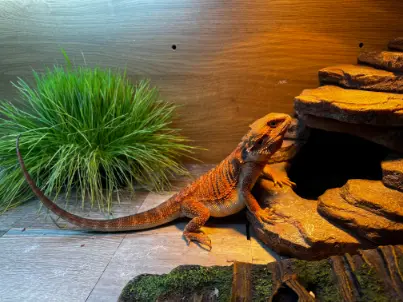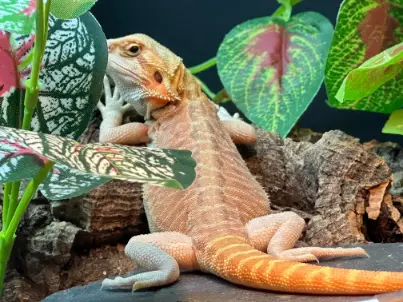Bearded dragons are among the most popular pet lizards around. These gentle creatures have been kept as pets for decades, but unlike cats and dogs, there is a lot about them that most people don’t know.
One of the biggest mysteries surrounding bearded dragons is whether or not they hibernate. After all, if you’re going to keep one as a pet, it would be nice to know if they’re able to take care of themselves during colder months.
In this article, I’ll discuss whether bearded dragons hibernate and what factors might influence their behavior in cold weather. You’ll also learn how you can help your pet lizard stay warm and healthy during wintertime.

What is Hibernation
Hibernation is a type of deep sleep many animals enter during colder months. Its purpose is to reduce their body activity and conserve energy.
During hibernation, an animal’s breathing, heart rate, and metabolism will drastically slow down. The animal will remain in this state for weeks or months depending on the climate conditions.
Different species of animals, such as bears, turtles, and some rodents, survive winter by entering a state of hibernation.
Hibernation vs Brumation
Hibernation and brumation are two completely different phenomena. Hibernation is a way for some animals to survive cold winters without having to look for food by slowing down their body temperature, breathing, and heart rate.
Brumation, on the other hand, is only found in cold-blooded creatures — like reptiles and amphibians — who lack fur or feathers.
Do Bearded Dragons Hibernate in the Winter
Bearded dragons do not hibernate during the winter, setting them apart from other species. To ensure your pet dragon stays active during this time of year, you must create the right environmental conditions for them. This includes regulating temperatures through heating and cooling and providing adequate lighting.
Additionally, you must create a stimulating environment with plenty of hiding places, toys, and vegetation so that your Bearded Dragon has something to occupy its time with. Not only will this help to keep your pet active throughout the winter but it will also help prevent any potential hibernation-like states due to low temperatures or heat stress from overly high ones.
Make sure that light is also in balance, providing around 12 hours each day, so build a timer accordingly if needed. Doing all these things can help to make sure your Bearded Dragon stays healthy and happy all year round without going into any sort of hibernation state.
Signs and Symptoms of Hibernation
Bearded dragons do not typically show any distinct signs of hibernation, making it difficult to know if they are entering this state. However, if your bearded dragon seems to be sleeping more than usual and has a decrease in appetite and activity, this could indicate that it’s preparing to hibernate. Other symptoms include a drop in body temperature and a change in color and skin texture.
It’s important to remember that even if your pet is exhibiting these characteristics, it may still not be entering into a true hibernation state due to the lack of proper environmental conditions such as cool temperatures or darkness.
Knowing the signs and symptoms of hibernation can help you better understand your pet’s behavior and ensure that they are healthy and safe at all times.
Conditions of Hibernation
Bearded dragons will enter into hibernation when their environmental conditions meet the required criteria. The ideal conditions for a successful hibernation require the temperature to be below 10 °C (50 ° Fahrenheit), minimal light exposure, dry air, and continuous access to food.
The environment needs to be deep, dark, and cool in order for your bearded dragon to enter hibernation mode successfully. If these conditions are not present, then they will remain active and continue to regulate their body temperature throughout the winter months, meaning you’ll need to make sure you provide the right conditions for them to stay healthy.
Do Bearded Dragons Need to Hibernate
Although bearded dragons do not hibernate, they may enter a state of brumation when temperatures drop or the seasons change. Brumation is a process similar to hibernation for warm-blooded mammals, in which reptiles slow their heart rate and metabolism to conserve energy during cold periods.
In wild settings, it’s common to see all dragons in the same environment entering brumation at the same time. However, this isn’t necessary for captivity as each dragon responds differently.

How Long Do Bearded Dragons Hibernate
Bearded dragons in their natural habitat can hibernate for up to 3 months at a time, but this is not a regular behavior. Bearded dragons usually do not enter a hibernation-like state when they are in captivity.
The conditions required for them to hibernate are usually not met in a captive environment and thus bearded dragons kept as pets rarely hibernate.
Why Don’t Bearded Dragons Hibernate
Bearded dragons don’t hibernate because they don’t have the right environmental conditions required to do so. The temperatures they thrive in aren’t consistent enough for true hibernation, and suitable shelter and darkness are also needed which are not always available for these animals.
The physiology of bearded dragons isn’t suitable for them to get into a long deep sleep associated with hibernation as other reptiles can. They require more food, water, and activity than other reptiles, so it’s much harder for them to enter a state of hibernation.
Keeping Your Bearded Dragon Active Year-Round
Keeping your bearded dragon active year-round requires proper temperature regulation, sufficient lighting, and a stimulating environment. The ideal daytime temperature is between 75-85 degrees Fahrenheit, while at night it should be 65-70 degrees Fahrenheit. Check with an infrared thermometer to make sure temperatures stay within these ranges.
Having appropriate lighting is vital for your bearded dragon; it is necessary for Vitamin D3 production in their body, which helps them absorb calcium and avoid metabolic bone disease. Make sure you create heated basking spots too; they should be at the upper end of the temperature range.
Your bearded dragon needs plenty of space to explore and play. Giving them safe toys like cardboard boxes, paper towel rolls, and small items that they can grasp will help keep them entertained and healthy year-round.
Monitor the environment for anything that could pose a risk to your pet, and ensure no sharp edges or objects are present. Following these regimes will ensure your pet remains active all year long!

FAQs
What Do Bearded Dragons Do When They Hibernate?
During the process of brumation, your bearded dragon will enter a hibernation-like state. They may not eat or drink, and that can be concerning for pet owners, but it’s an essential and natural occurrence that should be respected not hampered.
Do Bearded Dragons Wake up During Brumation?
It’s common for Bearded dragons to awaken from brumation, depending on the severity of their hibernation; they may be active for one day or longer before reverting back to sleep.
Do Bearded Dragons Need Water During Brumation?
Your bearded dragon will enter a deep sleep during brumation and need little care, though it’s still important to provide food and water for them to survive.
Can I Hold My Bearded Dragon During Brumation?
Brumation periods can be difficult for reptile owners as they tend to involve less contact with their pets, however, it is essential that reptiles are allowed to complete the cycle.
Conclusion
In conclusion, bearded dragons do not typically hibernate in captivity, but they may do so if the conditions are right. If you want to provide your bearded dragon with a hibernation period, be sure to place them in an environment that mimics their natural surroundings as closely as possible.
Once inside this hibernation box, ensure that the temperature is kept at an optimal level and monitor their progress regularly. With a bit of care and attention, your bearded dragon can enjoy a peaceful winter snooze without any problems!